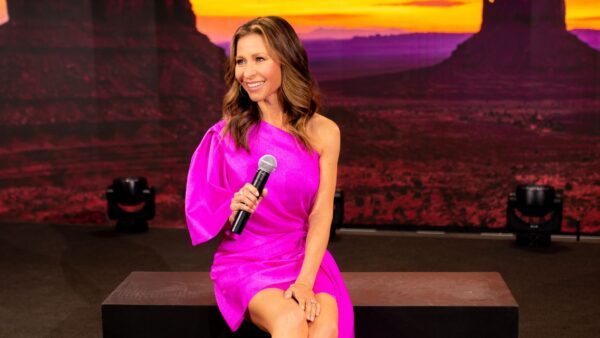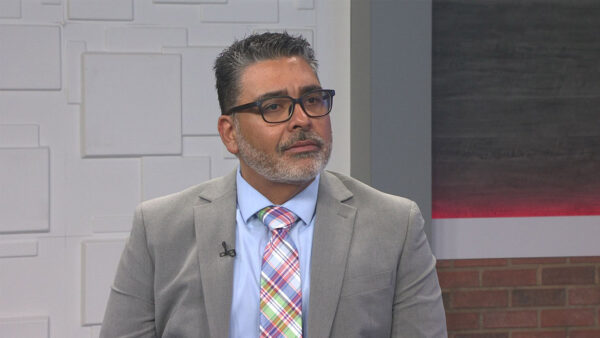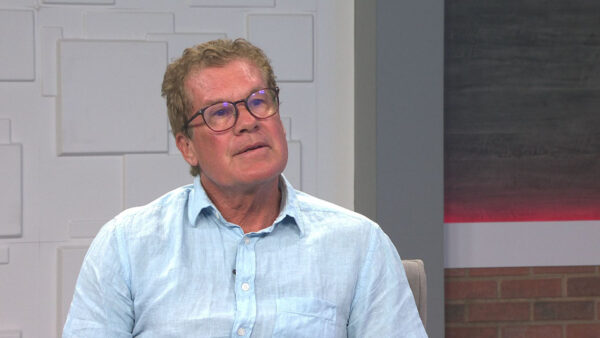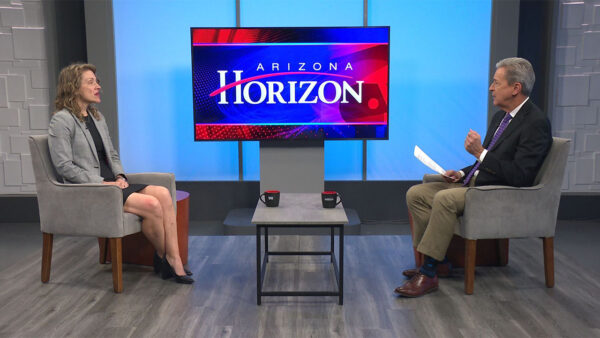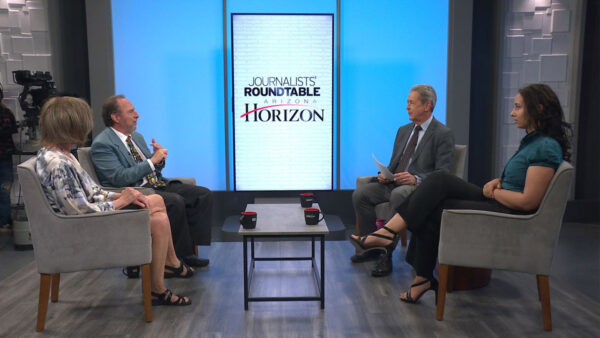Find out what Arizona’s doing to get a slice of more than $4 billion in federal “Race to the Top” money that will be awarded to states that implement educational reform and bring innovation into the classroom. Representative Rich Crandall, Chair of the House Education Committee, and Debra Duvall, a Special Advisor to the Governor, back from a trip to Washington, D.C. to meet with “Race to the Top” officials, discuss Arizona’s effort to compete for the money.
Ted Simons: Good evening and welcome to "Horizon." I'm Ted Simons. More than $4 billion are available to states that reform education and bring innovation to the classroom. But states will have to win their share of the money in a competition called "Race to the Top". Last week, Arizona officials were in our nation's capitol learning what it will take to win that race. Among those making the trip -- Representative Rich Crandall, who chairs the house education committee. And Dr. Deb Duvall, former superintendent of Mesa schools, who is now a special adviser to the governor overseeing the state's involvement in "Race to the Top." Thank you both for joining us tonight on "Horizon."
Dr. Deb Duvall: Certainly.
Ted Simons: How much is the state realistically looking at as far as this money is concerned?
Dr. Deb Duvall: Well, we don't have an exact figure. We know that the total amount available is $3.4 billion. And we're anticipating that the funds will be distributed to a few number of states, less than ten, maybe five. So do the math.
Ted Simons: Is this the kind of thing where they award achievement or do they award ideas?
Dr. Deb Duvall: Actually, what this grant requires is that you give proper evidence that your state is already in a reform movement. And Arizona is in good shape for that piece of it. The conditions that we have existing in our state across the four reform areas really puts us in good stead for this application. Once you show that information, the next thing you have to do is, what is going to be your next steps? So you have to present a plan to move from where we are to where we want to be in each of those four reform areas.
Ted Simons: I want to get to those four reform areas in just a second. Do you agree, because I think some people might be surprised to hear that Arizona is in good shape as far as education reform.
Rep. Rich Crandall: The reason we're in good shape is we need to make some strides forward. you look at our opportunities for school choice, the ability that parents have to decide where their kid goes to school, that's probably number one on the administration, the federal administration's list, is parent choice. We lead the nation in parent choice. We have fantastic districts, charters, we have great private schools.
Ted Simons: Let's get to the four areas now quickly. Making progress toward college career ready standards. Standards and assessments basically. Talk to us about it.
Rep. Rich Crandall: We've been working on this for about two years. We won a grant two years ago focusing on college and career readiness. We're one of the lower states in kids who go to high school to college. Not just four-year degrees but even community college. We're looking to improve that, we have the AIM exam in 10th grade. What do we do to prepare and challenge kids for the junior and senior year?
Ted Simons: Another one of these standards is losing longitudinal data to measure teacher performance, student learning, these sorts of things. What in the heck are we talking about?
Dr. Deb Duvall: What we're talking about is statewide longitudinal data system so that youngsters, students and their teachers would have an identifier and we would be able to track the achievement and the success of students as they enter the system all the way through high school graduation and ultimately as they move through community college or even the university or other college system within and actually outside of our state. What we're attempting to do and we've had some grants in the past. Our Arizona department of education is on a good track. That's another one of the reasons that Arizona is in good stead for this competition. We've been making progress toward the implementation of a longitudinal data system that would impact all students and all teachers at all levels of our education in Arizona.
Ted Simons: Those first two criteria that we talked about, are you seeing the state in good shape on both of those?
Rep. Rich Crandall: The state of Arizona is in good shape. However, think about this, you have $3.4 billion, 50 states are competing for it. States are pulling out their A - game. Louisiana hired Tony Blair's education minister. Minnesota with Governor Paul Pawlenty pulling out A - games. You are seeing incredible efforts in this. We'll have to be at our best to win this.
Dr. Deb Duvall: But Arizona is benefiting from observing some of those situation that include consortiums that include some of the states so we know what they're doing.
Ted Simons: That's a good point. There are things we can learn from some of the other states.
Rep. Rich Crandall: Not only that, if I could, ted. The governors made a very good move. Dr. Deval has been involved in the state. Bringing back the p-20 council. We're going to have to have that P-20 if we're going to win any of this money.
Ted Simons: Explain the p-20 council.
Rep. Rich Crandall: It's a group of education experts from business, higher ed, foundations, everybody coming together to move forward in the same direction.
Ted Simons: Third guideline, teacher effectiveness.
Dr. Deb Duvall: Great teachers, great leaders.
Ted Simons: That's basically it?
Dr. Deb Duvall: That's basically it. You use your longitudinal data system and those standards and assessments to make some of those judgments as to who are those effective and great teachers and effective and great leaders.
Ted Simons: You're going to get the longitudinal data system in each one, aren't you?
Dr. Deb Duvall: Well, it fits each one.
Rep. Rich Crandall: It does. Another interesting point. This is bipartisan. You look where Arnie Duncan and president Obama are going with parent choice, charter schools, performance pay for teachers, the Democrats for Education Reform, a national website. It's got some of the great principles this republicans have been fighting for. The governor rates across the aisle with Dr. Deb Duvall. It's complete bipartisan also.
Ted Simons: Guideline number four, improve achievement in low performing schools. First of all, what's the explanation here? Secondly, how are we doing?
Rep. Rich Crandall: Our AIMS testing has done a great job of bringing up the bottom tier. Where do we go from here now? We still have kind of a high dropout rate. We're not performing all that well. There are lots of things that can be done. I think that's where the p-20 comes in.
Dr. Deb Duvall: That's referred to for support for low-performing, struggling schools. If you look at the federal register that identifies the guidelines and rules and regulations associated with the "Race to the Top" grant application, low-performing schools is defined. We know exactly what they mean when they talk about low-performing schools. In our case, we have great diversity within this state. As we look at our plan and develop our plan for the "Race to the Top" grant application, we need to make sure that we're addressing the diversity that exists in northern Arizona and the diversity that exists within the metropolitan areas and most definitely our rural areas. again, going back to Arizona being in good stead, when you look at our state and those areas of our state, if our plan can address those particular areas, in addition of course to the metropolitan areas, that will put Arizona's plan possibly a notch above some of the other states who would not have that kind of diversity to address.
Ted Simons: You went and had a meeting at the nation's capitol regarding this. Relatively quickly, talk about the meeting and what kind of response you got.
Rep. Rich Crandall: They brought in the head of "Race to the Top" for the U.S. department of ed. We were there with 34 other states. Very blunt, here's how it's going to work, here's what we're looking for, very much laid out for us. One thing we have going for us, the Gates Foundation. I got the meet with Bill Gates to talk about education reform. They've taken a keen interest in Arizona. They're putting resources into the state to help us with our application process. It doesn't hurt to have a man like Bill Gates behind you.
Ted Simons: Not at all. A final date for proposal and when does money get allocated?
Dr. Deb Duvall: Again, according to the published rules and regulations, which are possibly in a state of flux, we're expecting a December application date for the first phase. What we hear is, if that date holds, there will probably be very few, one or two states that might get awarded in the first phase. The second phase would be mid-spring. If you submit an application in the first phase, which we're intending to do, if we're not one of the few states awarded, we'll resubmit in the second phase.
Ted Simons: You can find out who won in the first phase and look.
Dr. Deb Duvall: Right.
Rep. Rich Crandall: They'll give you feedback on your application.
Ted Simons: Fascinating stuff. Good luck and thank you for joining us tonight on "Horizon."
Both: Thank you, ted. We appreciate it.
Rich Crandall:State Representative and Chair of the House Education Committee;Debra Duvall:Special Advisor to the Governor;


